Overview
The article highlights the critical features of a custom CRM that are vital for the success of Software as a Service (SaaS) businesses. It asserts the necessity of:
- Adaptability
- Integration
- User-friendly design
- Robust analytics
- Automation
- Mobile accessibility
- Security
- Scalability
- Customer support
Each of these components collectively enhances operational efficiency, strengthens customer relationships, and drives overall business growth. By understanding and implementing these features, SaaS businesses can position themselves for sustained success in a competitive market.
Introduction
In an era where customer relationships can determine the fate of a business, the demand for tailored Customer Relationship Management (CRM) systems has skyrocketed, especially among SaaS companies. Custom CRMs not only address unique business requirements but also significantly boost operational efficiency and client satisfaction. As organizations pursue growth and adaptability, a pivotal question emerges: what essential features must a custom CRM possess to thrive in the competitive SaaS landscape? This article explores ten critical elements that can elevate a standard CRM into a formidable tool for driving business results and nurturing enduring customer connections.
SDA: Tailored CRM Development for Unique Business Needs
SDA excels in developing custom CRM solutions that cater to the distinct requirements of various industries. With their extensive expertise in software development, SDA creates CRMs designed to enhance user experience and stimulate growth. Their methodology centers on close collaboration with clients, allowing for a comprehensive understanding of workflows and challenges. This results in CRMs that not only meet but frequently exceed expectations.
For instance, healthcare providers may require CRMs that seamlessly integrate patient management features, while SaaS companies often seek advanced analytics capabilities. This adaptability is essential, as recent trends suggest that tailored CRM solutions can lead to a 29% increase in revenue and a 34% boost in productivity after integration. Moreover, companies utilizing CRM automation have reported renewal rate increases of 10% to 20% compared to manual tracking.
Industry leaders underscore the significance of custom CRM, with insights indicating that organizations employing tailored CRM solutions achieve up to a 300% enhancement in lead conversion rates. Jim Rohn aptly noted that one client well taken care of could surpass the value of $10,000 worth of advertising, emphasizing the importance of client relationships in CRM development. Additionally, the global CRM market is projected to reach $145.61 billion by 2029, underscoring the growing relevance of CRM solutions. By prioritizing the unique needs of each client and incorporating AI capabilities, SDA positions itself as a trusted partner for organizations seeking to implement effective CRM systems that drive measurable results.
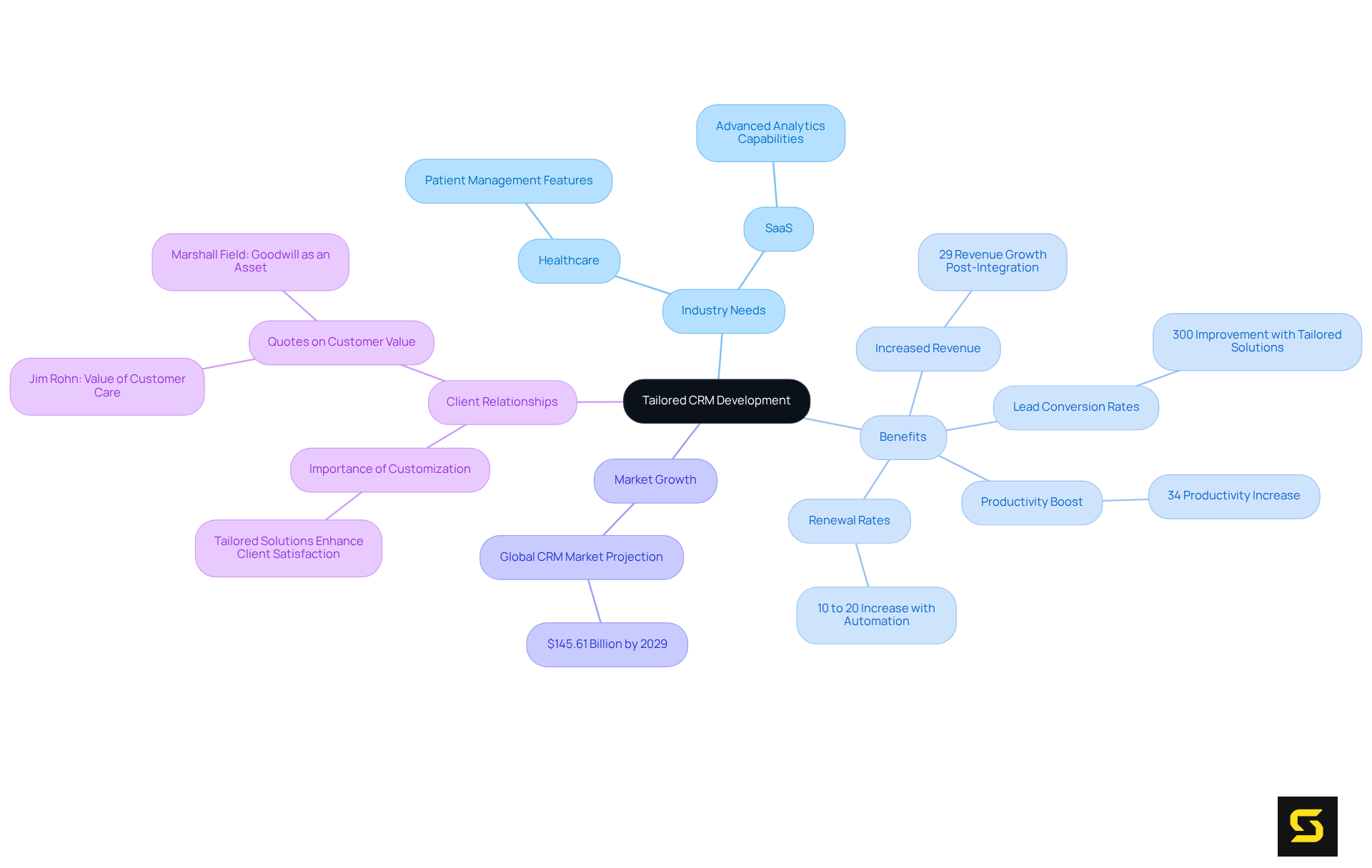
Customizability: Adapt Your CRM to Fit Unique Workflows
A significant advantage of a custom CRM is its ability to adapt to unique workflows. Many businesses operate with specific processes that off-the-shelf solutions simply cannot accommodate. A custom CRM empowers organizations to modify features, dashboards, and reporting tools, aligning them precisely with their operational needs.
Consider a fitness company, for example. It may seek to monitor member engagement in a manner distinct from how a retail establishment tracks customer purchases. By tailoring the custom CRM to their specific requirements, companies can ensure the collection of the most pertinent information. This results in enhanced insights and improved decision-making, ultimately driving better business outcomes.
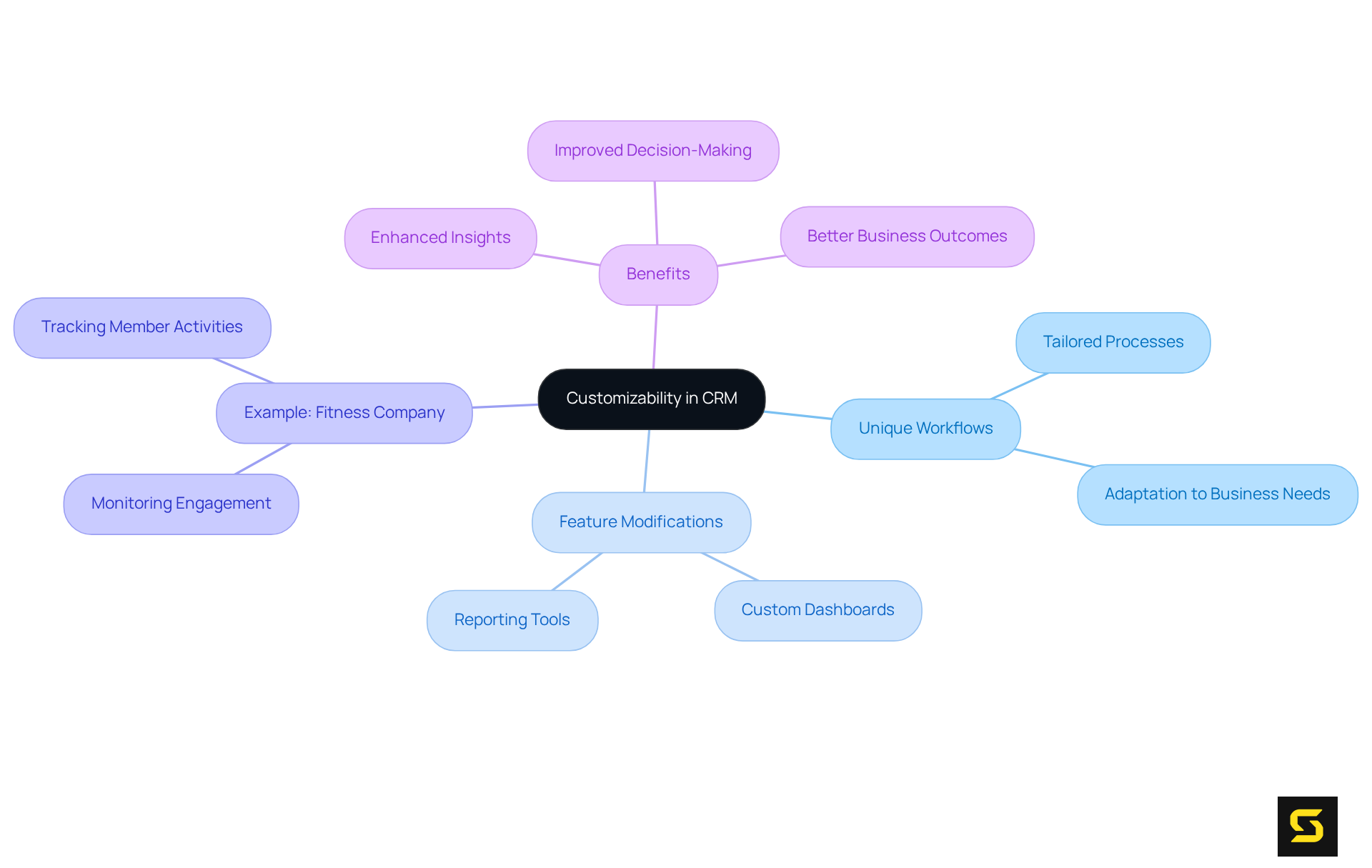
Integration: Connect Your CRM with Existing Tools and Platforms
A custom CRM must seamlessly connect with the current tools and platforms employed by an organization; this integration is crucial for preserving data consistency and enhancing operational efficiency. Integrating the custom CRM with marketing automation tools can significantly streamline lead generation and improve client engagement efforts. Statistics indicate that businesses leveraging custom CRM systems experience a 29% increase in sales and a 34% improvement in sales productivity. Furthermore, custom CRM systems can improve customer retention rates by up to 27%, further emphasizing the benefits of integration.
Connecting the CRM with accounting software allows for improved financial tracking and reporting, facilitating better decision-making. By ensuring that the custom CRM can interface with other essential systems, organizations can create a cohesive ecosystem that enhances productivity and reduces manual data entry. Recent advancements in CRM integration technology, including the rise of generative AI, are transforming how businesses operate, making it easier to automate processes and improve overall efficiency. Businesses using generative AI are 83% more likely to exceed sales goals, highlighting its significant impact on CRM systems.
As William Jepma notes, "AI is transforming finance and accounting by streamlining processes that were once manual, time-consuming, and error-prone." Effective integration of a custom CRM not only improves operational efficiency but also promotes a more tailored client experience, which is essential for driving sales and client loyalty. However, organizations should also be aware of challenges such as information migration, user adoption, and system compatibility that can arise during integration. To maximize the benefits of CRM integration, consider conducting a thorough assessment of your existing tools to identify integration opportunities.
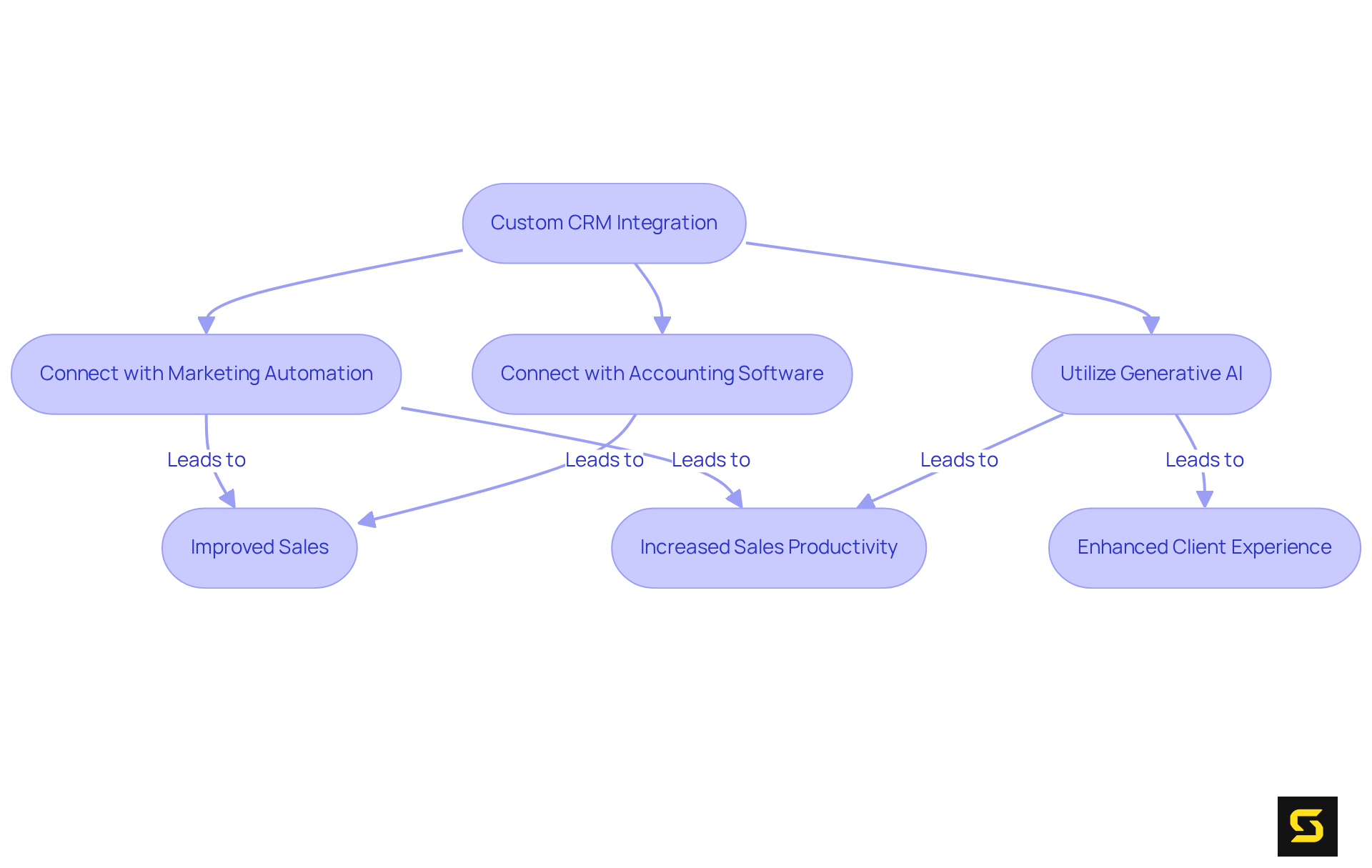
User-Friendly UI/UX Design: Enhance User Adoption and Satisfaction
The design of a CRM's user interface (UI) and user experience (UX) is crucial for its adoption and effectiveness. An intuitive CRM enables users to navigate effortlessly and access necessary information without unnecessary complexity.
Incorporating visual dashboards and straightforward navigation significantly enhances user satisfaction. When employees find the CRM user-friendly, they are more inclined to engage with it frequently, leading to improved data entry and client management practices.
To maximize the effectiveness of your CRM, prioritize a design that fosters ease of use and accessibility, ensuring that your team can fully leverage its capabilities.
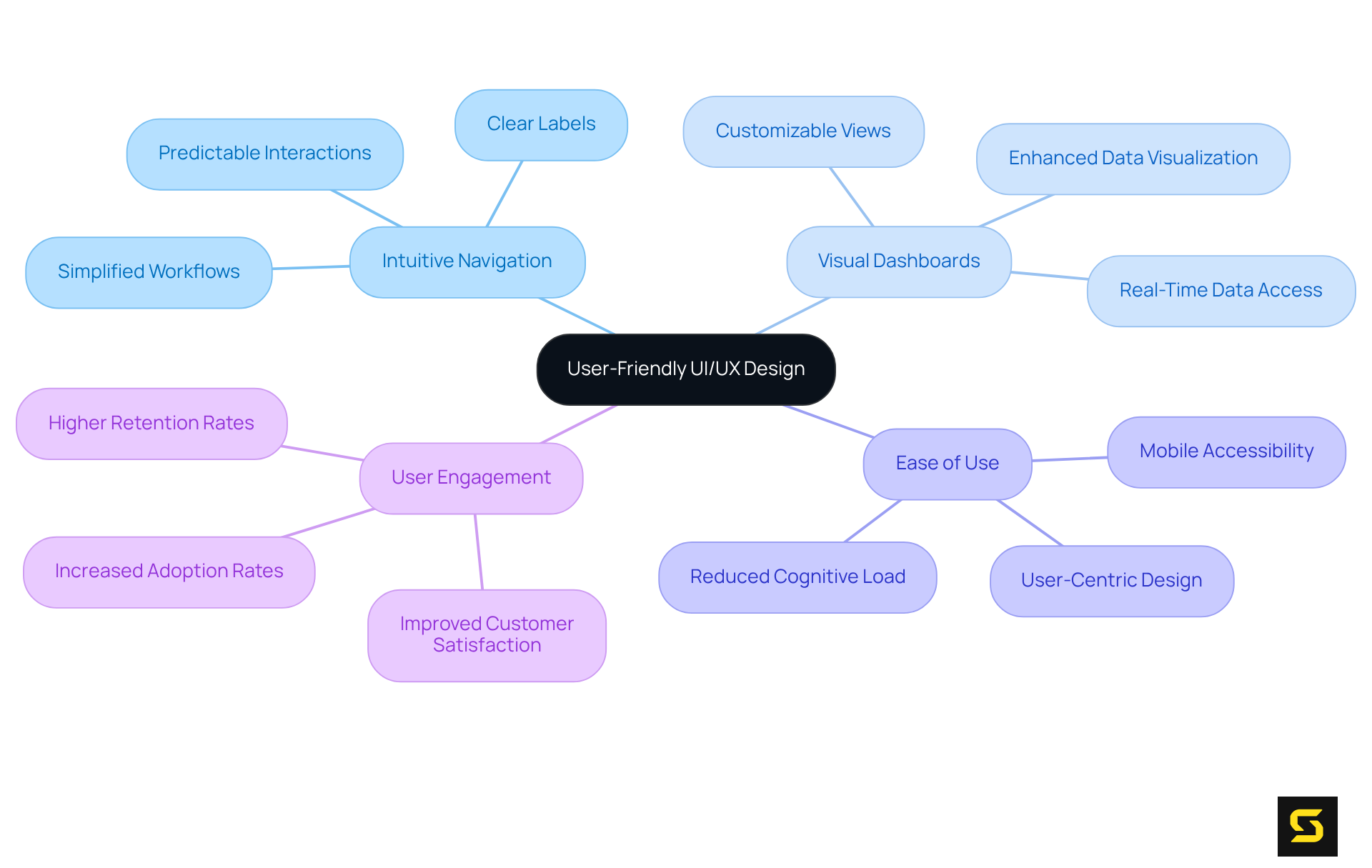
Reporting and Analytics: Drive Data-Driven Decisions with Your CRM
A robust custom CRM must include comprehensive reporting and analytics features that empower businesses to effectively monitor key performance indicators (KPIs) and client interactions. These tools facilitate the analysis of trends, measurement of campaign effectiveness, and identification of areas for improvement.
For instance, SaaS companies can leverage CRM analytics to track user engagement and retention rates—elements crucial for refining marketing strategies. By harnessing data-driven insights, organizations can make informed decisions that not only enhance customer relationships with a custom CRM but also drive significant growth. Remarkably, CRM software can boost conversion rates by as much as 300%, underscoring the transformative impact of efficient information use on sales performance. As the CRM landscape continues to evolve, it is essential to stay abreast of the latest trends in reporting features to maintain a competitive edge.
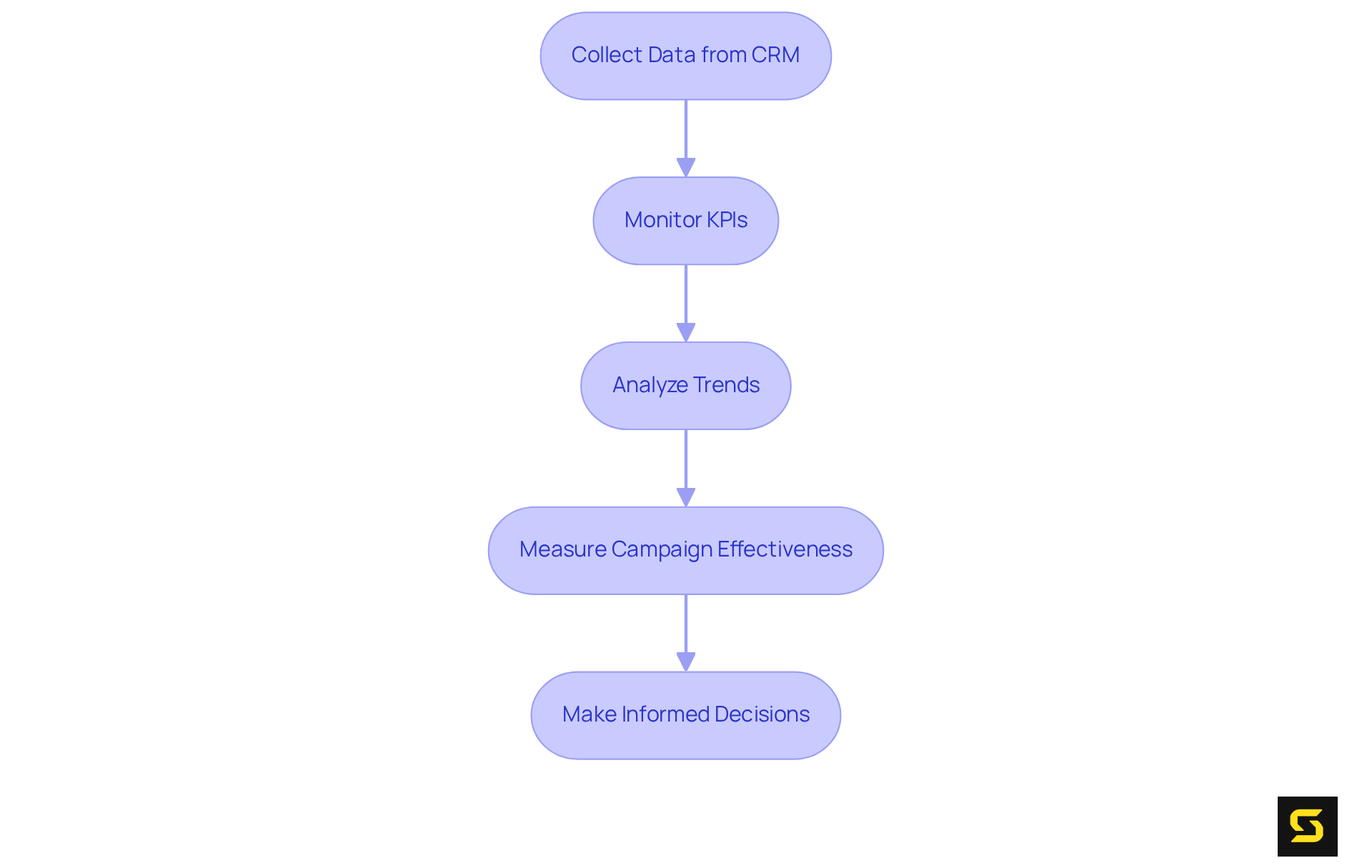
Automation: Streamline Tasks and Improve Efficiency
Automation serves as a cornerstone of contemporary CRM systems, empowering businesses to optimize repetitive tasks such as data entry, follow-up emails, and lead assignments. By leveraging automation, organizations can significantly minimize human error and enhance operational efficiency.
Consider a custom CRM solution that can automatically send reminders for follow-ups or arrange appointments based on client interactions. This capability not only conserves valuable time but also ensures that no potential opportunities slip through the cracks, ultimately boosting customer satisfaction and engagement.
The impact of CRM automation is profound; these systems save companies 5-10 hours of employee workload each week by automating repetitive tasks. Furthermore, 94% of companies report a rise in sales productivity after adopting a CRM service. As organizations increasingly embrace these automated features, they position themselves to achieve greater efficiency and effectiveness in their operations.
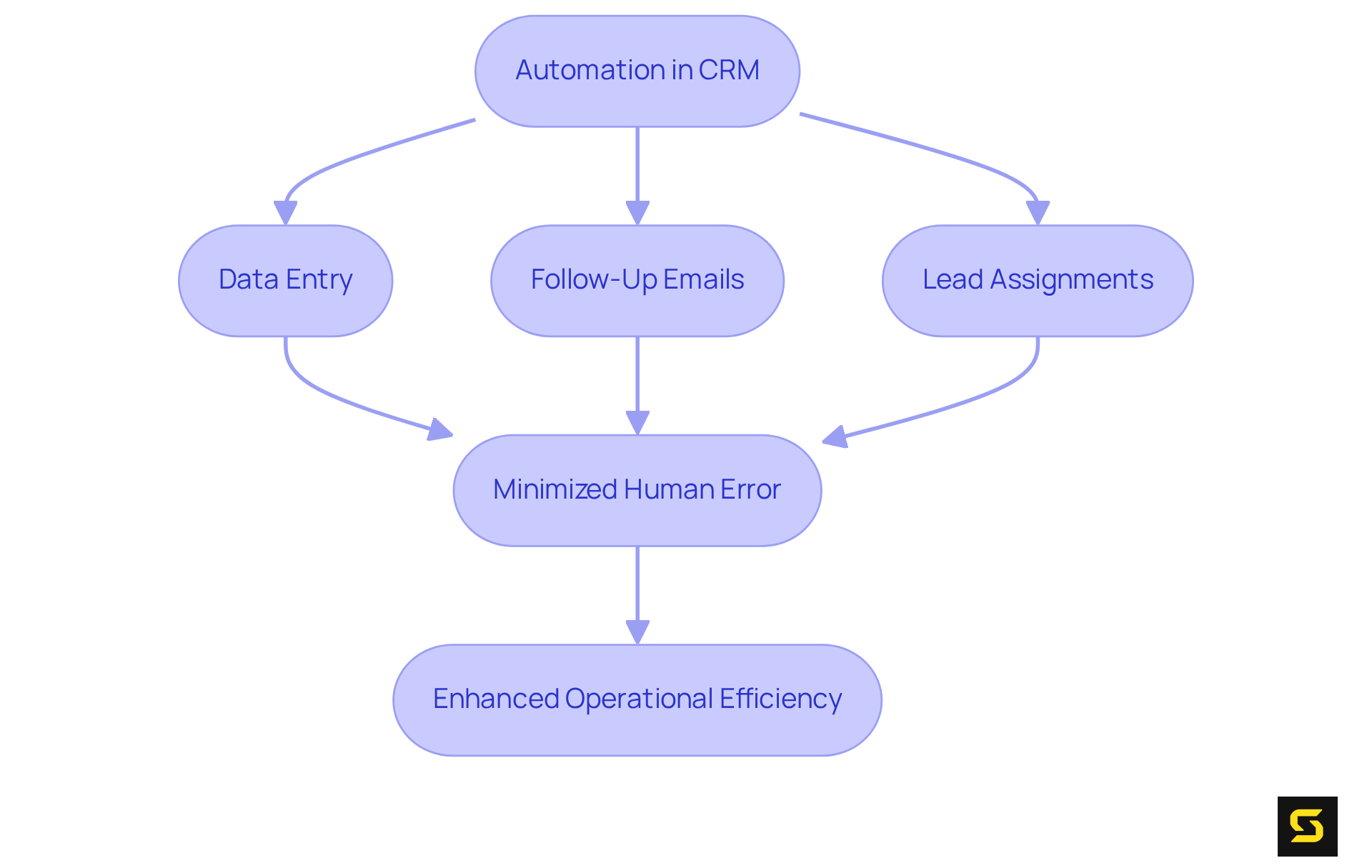
Mobile Accessibility: Access Your CRM Anytime, Anywhere
In today's fast-paced business landscape, mobile accessibility is not just an option; it is an essential feature for any CRM system. A mobile-friendly CRM empowers team members to access client information, update records, and communicate with clients from virtually anywhere, at any time. This flexibility is particularly advantageous for sales teams who frequently find themselves on the move. With real-time access to client information, they can swiftly respond to inquiries and make informed decisions during meetings, significantly enhancing relationships.
Current trends indicate a surge in mobile CRM utilization, with 70% of firms retrieving client information via mobile devices. This shift streamlines workflows and boosts productivity; organizations leveraging mobile CRM report a remarkable 14.6% increase in sales productivity. Furthermore, companies equipped with mobile CRM capabilities are 65% more likely to meet their sales quotas, underscoring the profound impact of mobile accessibility on team performance. Additionally, 70% of sales reps trust CRM solutions for closing deals, highlighting the reliability of mobile CRMs in enhancing sales effectiveness.
Sales leaders are acutely aware of these advantages, with many emphasizing the necessity of mobile-friendly CRMs in their operations. However, it is crucial to note that 48% of sales leaders believe their CRM system falls short of their needs, indicating ongoing challenges in the CRM landscape. As the CRM market continues to expand, driven by technological advancements and a focus on customer-centric strategies, the integration of mobile capabilities will remain a pivotal trend. This integration ensures that sales teams can operate efficiently and effectively in an increasingly digital world. According to Hinal Tanna, utilizing CRM technology enables businesses to automate repetitive tasks and access client information on the go, further boosting productivity.
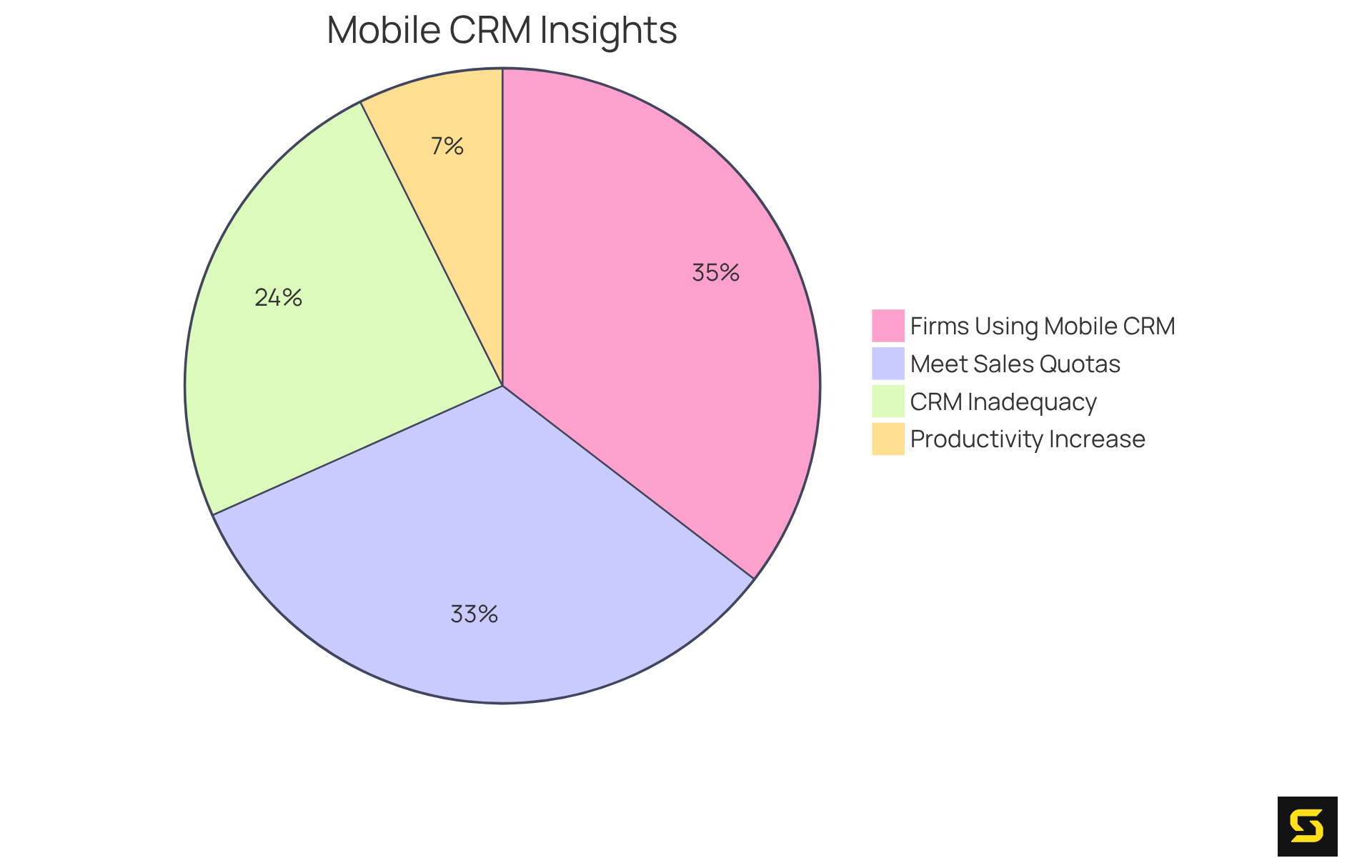
Security: Protect Sensitive Customer Data with Robust Features
Data security is paramount for any CRM system, especially when managing sensitive customer information. A tailored CRM must incorporate robust security features, including:
- Encryption
- User authentication
- Regular security audits
to effectively safeguard against breaches. Implementing multi-factor authentication (MFA) significantly enhances security by ensuring that only authorized users access sensitive information. This proactive measure can reduce the risk of unauthorized access by up to 80-90%, marking it as a critical component of any security strategy, as noted by industry experts.
Moreover, with 82% of breaches involving information stored in the cloud, organizations must prioritize cloud security as a vital part of their CRM information protection strategy. Recent advancements in CRM information protection underscore the necessity for companies to implement comprehensive security measures. Organizations that prioritize security not only bolster their defenses but also cultivate trust with their clients and ensure compliance with industry regulations. It is also essential to recognize that 74% of all breaches involve the human factor, highlighting the significance of employee training and awareness in safeguarding sensitive information. As cyber threats continue to evolve, investing in advanced security features is crucial for protecting customer information and maintaining a competitive advantage in the market.
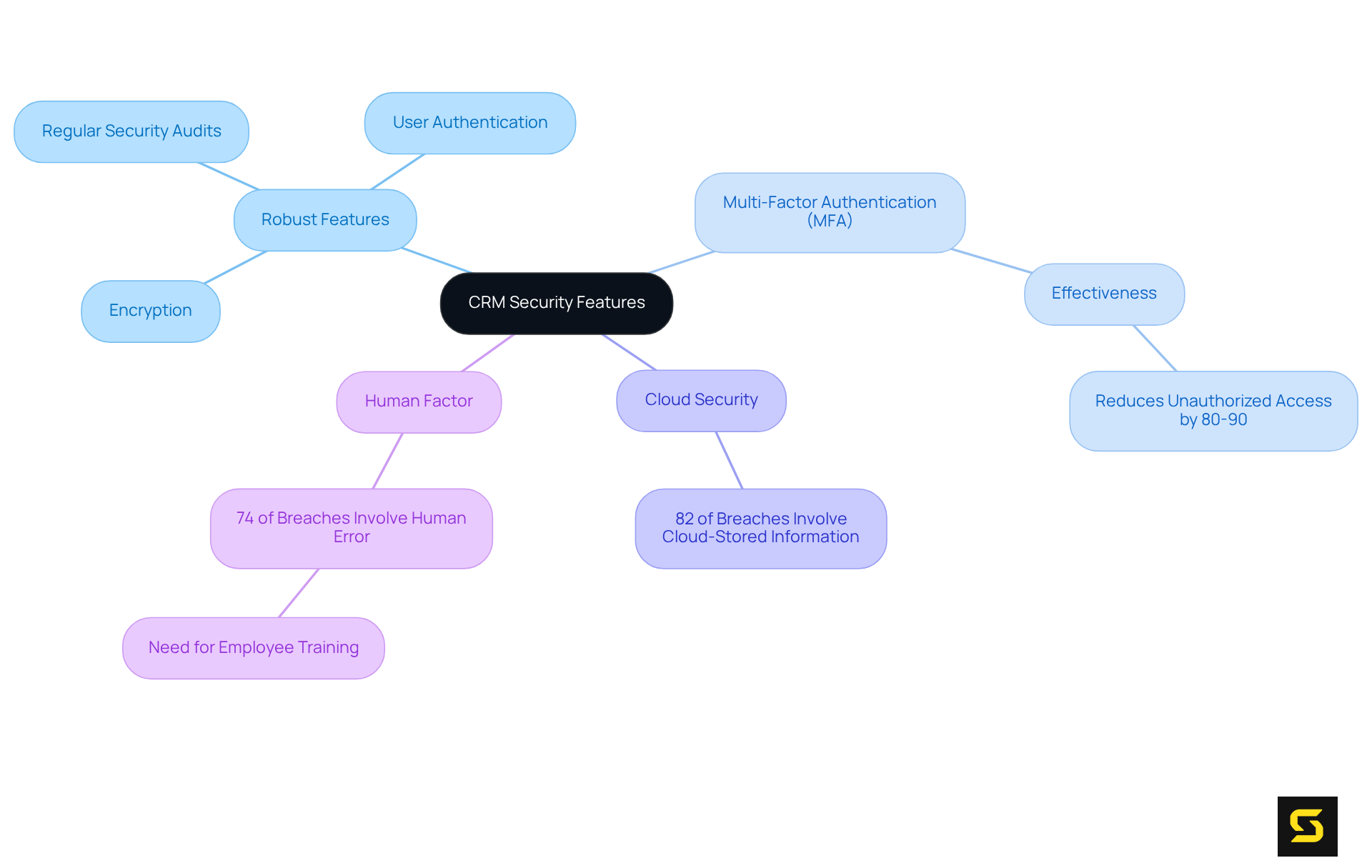
Scalability: Ensure Your CRM Grows with Your Business
A custom CRM must emphasize scalability, enabling it to evolve alongside the organization. As organizations expand, their CRM requirements frequently shift, necessitating additional features, users, or increased data capacity. For instance, a startup may begin with a limited user base yet anticipate rapid growth. A scalable CRM can seamlessly accommodate this expansion, eliminating the need for a complete system overhaul and ensuring operational efficiency during transitions.
The significance of scalable custom CRM solutions is particularly pronounced for startups, which often face unpredictable growth trajectories. Implementing a custom CRM that can adapt to changing needs not only supports immediate operational demands but also positions the organization for long-term success. Industry leaders assert that selecting the appropriate custom CRM is a strategic decision that can profoundly influence team efficiency, client relationships, and revenue growth. As Mick Goman observes, "By thoughtfully assessing CRM choices according to size, growth objectives, budget, and usability, you can choose a platform that not only fulfills your present requirements but also aids your organization as it grows."
Startups utilizing scalable CRMs have reported improved client satisfaction and retention, with 47% noting significant enhancements post-implementation. Furthermore, 91% of companies indicate a decrease in client acquisition expenses (CAC) after adopting CRM software. This adaptability empowers organizations to maintain a competitive advantage, ensuring they can respond effectively to evolving market demands and client expectations.
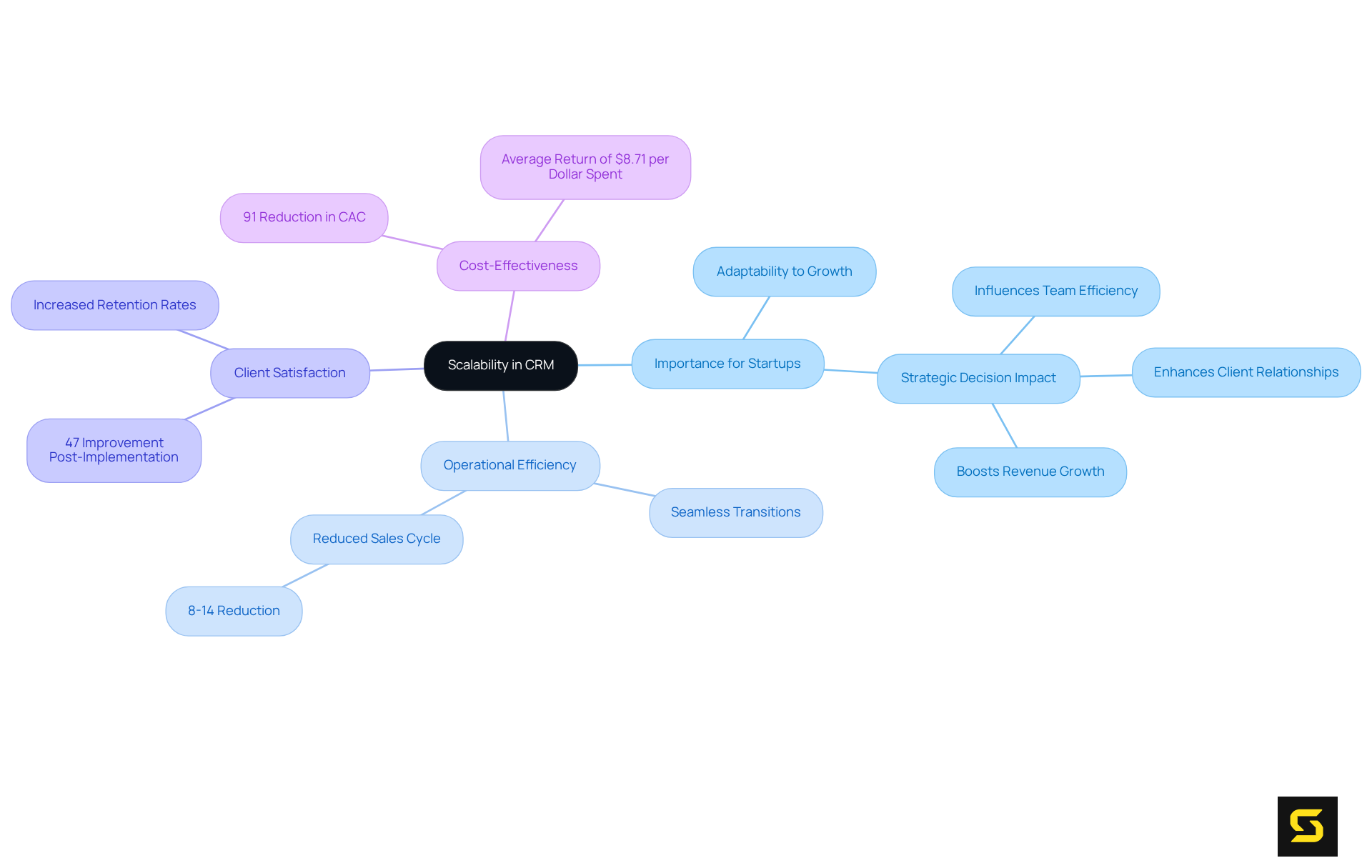
Customer Support and Training: Maximize Your CRM's Potential
To fully realize the potential of a custom CRM, businesses must decisively invest in customer support and training related to the custom CRM. Comprehensive training programs are essential; they ensure that users not only understand how to navigate the system but also utilize its features effectively.
Moreover, ongoing support is critical for promptly addressing any issues that may arise and for assisting users in adapting to new functionalities as they are introduced. By prioritizing training and support, organizations significantly enhance user adoption, thereby ensuring that their CRM delivers maximum value.
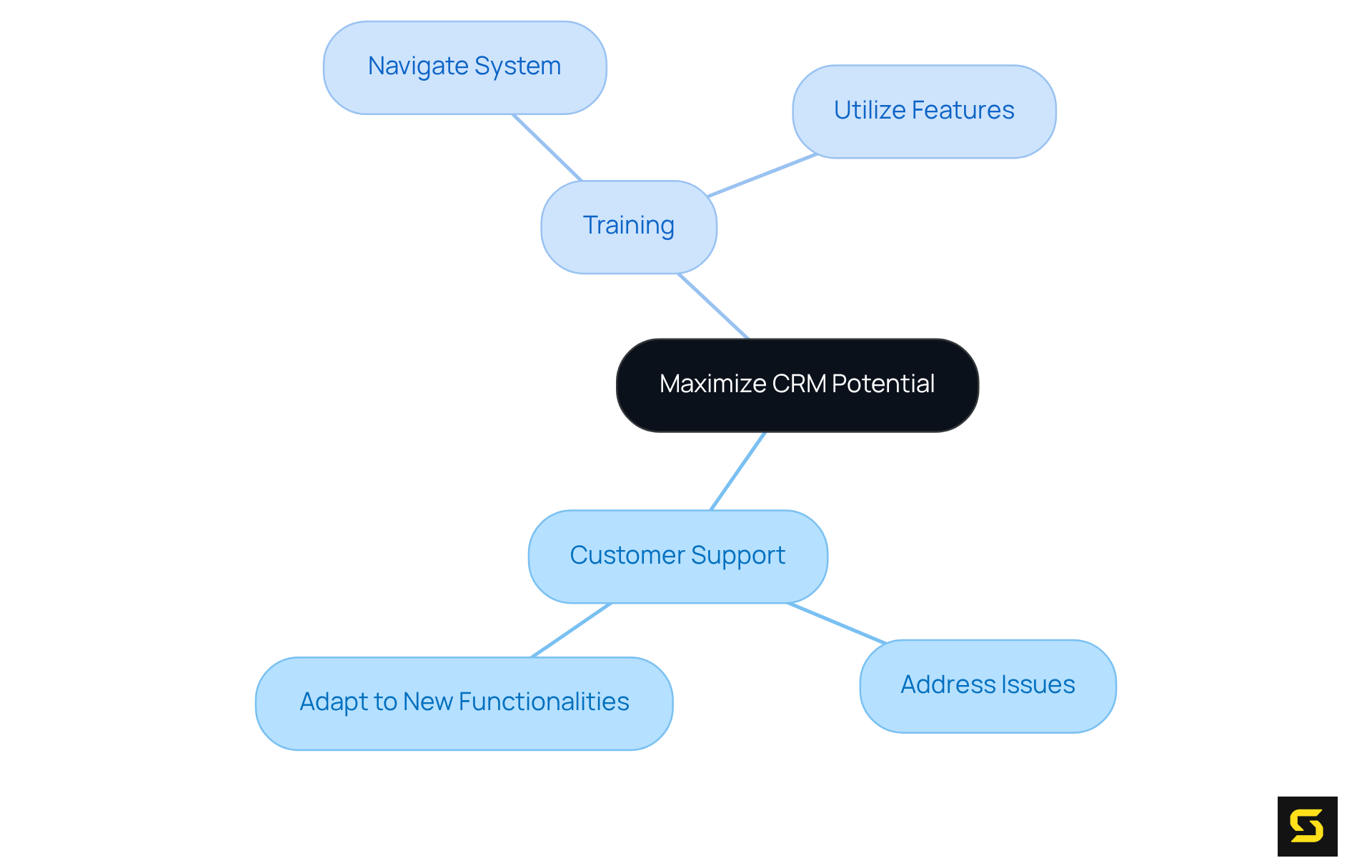
Conclusion
Custom CRM solutions are pivotal to the success of SaaS businesses, offering tailored features that address specific industry needs. By emphasizing customization, integration, user-friendly design, and robust security, organizations can develop a CRM system that not only meets current demands but also anticipates future growth. This strategic approach empowers businesses to enhance client relationships, streamline workflows, and ultimately drive revenue growth.
Key aspects of an effective custom CRM include:
- The ability to adapt workflows
- Integration with existing tools
- Comprehensive reporting and analytics
These features empower organizations to make data-driven decisions. Moreover, the importance of mobile accessibility, automation, and strong security measures cannot be overstated, as they significantly contribute to improved efficiency and trustworthiness. Investing in customer support and training further maximizes the potential of these systems, ensuring that users are well-equipped to leverage all available features.
In conclusion, embracing a custom CRM tailored to unique business requirements is not just a technological upgrade; it is a strategic imperative for any SaaS organization aiming for long-term success. As the CRM landscape continues to evolve, prioritizing these essential features will position businesses to adapt to market changes, foster stronger client relationships, and achieve sustainable growth. Organizations are encouraged to critically assess their CRM needs and invest in solutions that align with their objectives, ultimately paving the way for enhanced performance and profitability.
Frequently Asked Questions
What is SDA's approach to CRM development?
SDA specializes in developing custom CRM solutions tailored to the unique needs of various industries. Their approach emphasizes close collaboration with clients to understand workflows and challenges, resulting in CRMs that often exceed expectations.
How can tailored CRM solutions impact a business?
Tailored CRM solutions can lead to a 29% increase in revenue and a 34% boost in productivity after integration. Additionally, companies using CRM automation have reported renewal rate increases of 10% to 20% compared to manual tracking.
Why is customizability important in CRM solutions?
Customizability allows organizations to adapt their CRM to fit unique workflows and processes that off-the-shelf solutions may not accommodate. This ensures that businesses can collect pertinent information, leading to enhanced insights and improved decision-making.
How does integration with existing tools benefit a custom CRM?
Integration with existing tools is crucial for data consistency and operational efficiency. It can streamline lead generation, improve client engagement, and enhance financial tracking, ultimately driving better business outcomes.
What are the statistics related to the benefits of custom CRM systems?
Businesses leveraging custom CRM systems experience a 29% increase in sales, a 34% improvement in sales productivity, and up to a 27% improvement in customer retention rates.
What role does AI play in CRM integration?
Recent advancements in CRM integration technology, including generative AI, are transforming business operations by automating processes and improving overall efficiency. Businesses using generative AI are 83% more likely to exceed sales goals.
What challenges might organizations face during CRM integration?
Organizations may encounter challenges such as information migration, user adoption, and system compatibility during CRM integration.
How significant is the global CRM market?
The global CRM market is projected to reach $145.61 billion by 2029, highlighting the growing relevance and demand for CRM solutions.





